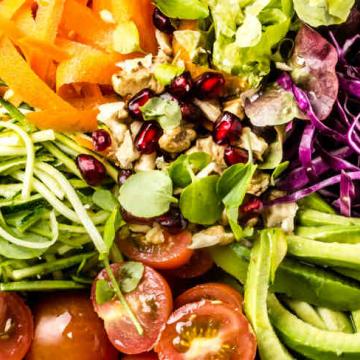Eating Well: Diet and Nutrition
Cancer survivors should strive for a plant-based diet full of fruits, vegetables and legumes to provide vitamins, minerals, fibers, carotenoids and other beneficial nutrients that help prevent cancer.
You should also incorporate whole grains and high-fiber foods — including whole-grain breads, cereals, rice, pasta and beans — into your diet. Associated with a lower risk of developing cancer, whole grain foods are made from the entire grain seed (wheat, rice, oats and barley) so they’re higher in fiber, vitamins and minerals than processed grains.
Avoid or limit their consumption of saturated fats, processed foods, high-calorie foods, added or refined sugars, and processed or red meat.
A major contributor of fat and cholesterol, processed and red meat are associated with an increased risk of developing cancer. Nitrates, which can lead to cancer, are added to many processed meats. Additionally, cooking meat at high temperatures produces mutagens and carcinogens known to cause cancer.
If you do eat red meat, opt for lean cuts and smaller portions, and prepare meat, poultry and fish by baking, broiling or poaching.
A diet emphasizing vegetables, fruits, whole grains and legumes can reduce your risk of developing cancer.
What You Should Eat:
- 2.5 cups of a variety of vegetables and fruits daily
- Include vegetables and fruits at every meal
- Emphasize whole vegetables and fruits
- Choose 100% juice if you drink vegetable or fruit juices
- Protein sources, such as beans, poultry or fish
- Whole grains instead of refined or processed grains
- Brown rice instead of white rice
What You Should Avoid:
- Creamy sauces, dressings and dips with fruits and vegetables
- Processed meats, such as bacon, sausage, luncheon meats and hot dogs
- Red meat including beef, pork and lamb
- Fried foods and charbroiled meat
- Refined carbohydrates, including pastries, candy, sugar-sweetened breakfast cereals and other high-sugar foods
Healthy Holiday Recipes
We offer updates on classic holiday side dishes and desserts, tested by City of Hope dietitians, that use seasonal vegetables and fruits, herbs, egg whites and spices to minimize the need for butter, salt and cream.
Of course, if you're a cancer patient, talk with your doctor, nurse or dietitian about any eating issues that might affect you during treatment.

